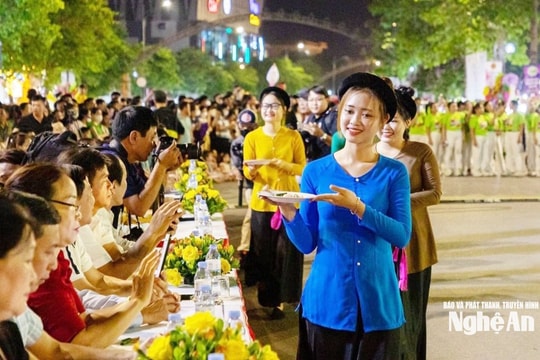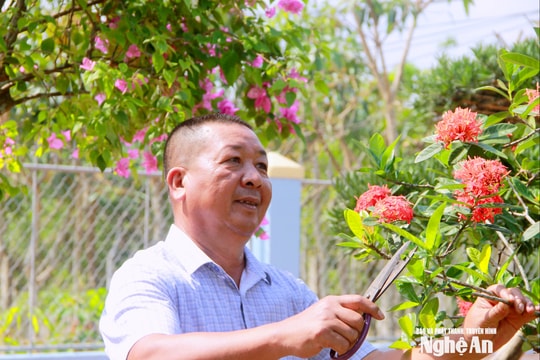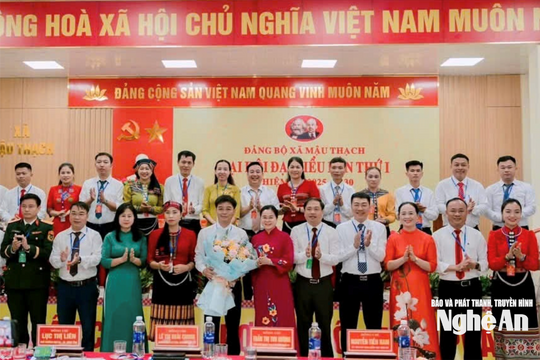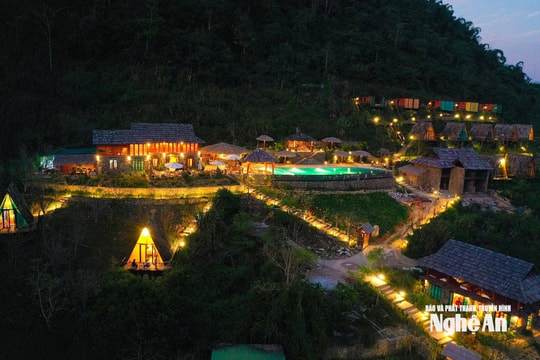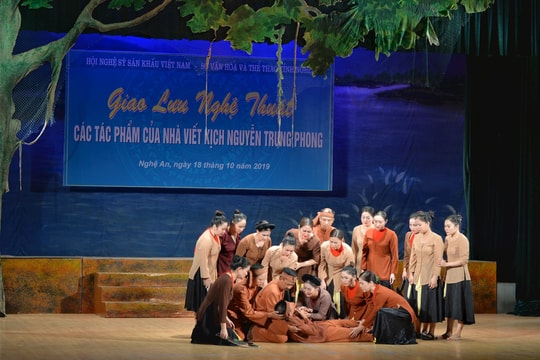Cactus on the sand
(Baonghean) - No matter what the circumstances, how difficult or arduous, the women of Nghe An still rise up to stand firm in life. They are likened to cacti on white sand...
1. The landlady of Dai Bac village
In 1978, Ms. Ngo Thi Nao in Dai Bac village, Quynh Long commune (Quynh Luu) married Mr. Nguyen Song Lam. Although they worked hard all day, hunger still followed her family.
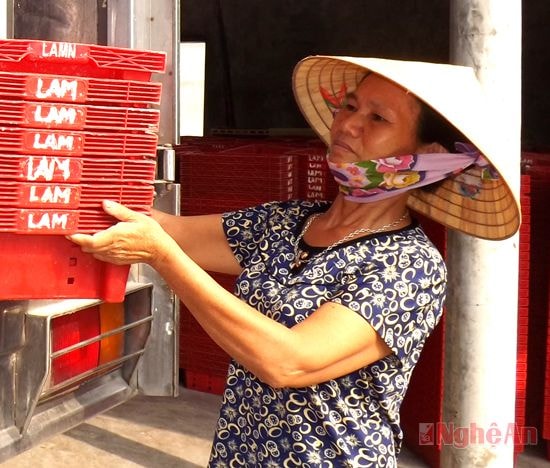 |
| Ms. Ngo Thi Nao loaded plastic trays onto the truck to go to Lach Quen port (Quynh Luu) to buy seafood. |
In 1995, realizing that there was no seafood purchasing facility for fishermen in the area, she discussed with her husband about opening a seafood purchasing and exporting service in the locality. Since Ms. Nao's family seafood purchasing facility was established, many fishing boats after returning from the sea had all their seafood consumed by her facility.
At that time, her business mainly purchased fish and squid, and then exported them to China. In 2010, Quynh Long fishermen switched from squid fishing to lead-seine fishing, which is a highly profitable profession. Seizing this opportunity, she once again discussed with her husband to prepare documents and bid for State land at Lach Quen fishing port (Quynh Thuan commune).
Ms. Ngo Thi Nao shared: "At first, when we moved to the new facility, because we were not familiar with the boat owners, the purchasing was limited, but after a while, there were about 30 family-owned boats accepting to purchase products."
To improve the efficiency of seafood purchasing for fishermen, Ms. Nao invested more than 3 billion VND in 3 trucks, 7,000 plastic trays for seafood, and built a number of facilities to store products after purchasing.
According to Ms. Nao, on average, her family's facility purchases 800 - 1,000 tons of various types of seafood per month. After purchasing, she sells them to businesses with cold storage and drying warehouses to package and export. After deducting expenses, on average, her family earns 350 - 400 million VND per year. Creating jobs for 15 local workers, each worker earns an average of 5 - 6 million VND per month.
Ms. Pham Thi Huong, a worker, said: “Thanks to Ms. Nao’s seafood purchasing facility, many women have jobs. We only work 10 days a month when the fishing boats return, the rest of the time we mend fishing nets for hire to earn extra income.”
Viet Hung
2. Share love
Having married into Quy Chau land and been involved in teaching for more than 20 years, teacher Nguyen Thi Thai, Principal of Chau Binh Primary School, has many memories of her career. One of the unforgettable things is organizing meals for primary school students…
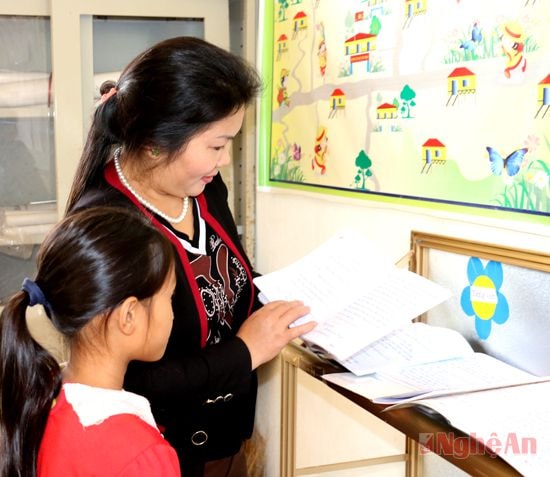 |
| Teacher Nguyen Thi Thai checks students' learning at Thung Khang school (Chau Binh, Quy Chau). |
The first days of her career were full of difficulties, but the more she worked with the students in the highlands, the more she saw the hardships of the students there, the more she told herself to try harder and try harder. After 10 years of working, she was promoted to a leadership position and in this position, she had more opportunities to support and help poor students.
When taking on the position of Principal of Chau Hoi 2 Primary School, the most difficult thing was to motivate students to go to school and maintain daily attendance. Chau Hoi is a poor commune with a large area. Chau Hoi 2 Primary School alone has 5 satellite schools, of which Khum village is nearly 10 kilometers away from the main school, on steep roads and through many streams. To solve this problem, the best solution is to let students study semi-boarding, but this policy is difficult to implement because most of the parents in the school are poor households.
Faced with this reality, she determined to "take action herself". Thinking is doing, from the 2012-2013 school year, she built a movement: "Sharing rice and clothes to organize school meals". In which, the first thing she did was to write a letter calling on philanthropists, charitable organizations and send it through mass media, through bridges, relationships... calling for support in cash or in kind.
The 2012-2013 school year was also the first year the school benefited from the Seqap Project, which supported poor students with 2 lunches per week, worth 10,000 VND/meal/student. Although only 40% of the school's students benefited, the school boldly organized for 100% of the students to have lunch per week.
In addition, the school's staff, teachers and employees also donated their salary during the Learning Promotion Month to buy books, pens, and clothes for poor students and to support the construction of kitchen facilities for students.
Not letting down the teachers, the students attend school diligently, there is no longer a phenomenon of students even on rainy days. The school has successfully merged from 5 schools to 3 schools, mobilizing 5th grade students from the remote village 8km away from the main school to study at the main school, conveniently teaching 2 sessions/day; the quality of education has been improved, entering the top 4 of the district.
After the success of Chau Hoi Primary School, for the past 2 years, teacher Thai has been transferred to Chau Binh Primary School. Here, besides taking care of every meal and sleep for students, she also cares a lot about quality. Therefore, every month, despite the difficult road conditions, she does not hesitate to go to remote schools, directly check the quality of students, and has many policies to encourage teachers to work in remote areas.
Teacher Nguyen Thi Thai shared: “The harder the children work, the more I love and care for them. The more difficult the place is, the more I have to care so that they do not feel disadvantaged.”
My Ha
3. Thai women are very capable
Like many other families in the border commune of Tri Le (Que Phong district), the starting circumstances of Ms. Luong Thi Cham's family in Yen Son village were very difficult, as their income depended entirely on slash-and-burn farming. The couple worked hard all year round but only had enough money to spend frugally to raise 2 small children, and the family had no valuables.
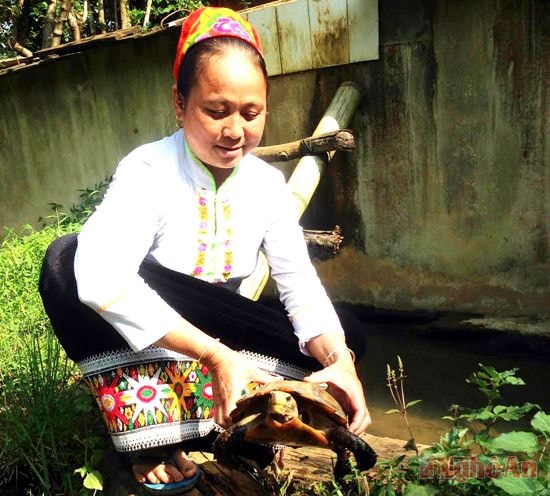 |
| Ms. Luong Thi Cham takes care of parrot-billed turtles. |
But unlike many other Thai and Mong women in the village, Ms. Cham does not accept poverty but always struggles to find ways to develop the economy.
With a capital of 10 million VND borrowed from the district Social Policy Bank, along with the support of family, relatives and friends, the couple invested in digging a pond, building a surrounding wall, then bought parrot-billed turtles and soft-shell turtles from the villages for breeding.
At that time, no one in the commune raised turtles, so she searched by asking the commune and district veterinary staff, and then heard about any house in the area that raised turtles and soft-shell turtles, she went there to learn from their experience. Up to now, her farm has nearly 100 parrot-billed turtles and 20 soft-shell turtles.
In addition to raising turtles and soft-shell turtles, Ms. Cham also raises commercial porcupines, black chickens, spotted deer, and fish to take advantage of the self-produced food source. Her annual income is from 60 to 70 million VND.
Ms. Cham shared: “My husband and I are both children of the Thai ethnic group who have lived here for many generations. Thanks to learning to read and write, I can read books and newspapers, and learn economic secrets from many places, so I can do it myself.”
Ms. Cham's family has been a typical cultural family for many years. Both of their children have studied at university, the eldest daughter, born in 1992, graduated from Hue University of Education, the second child is in her final year at the Logistics Academy.
Ms. Vi Thi Sinh, Chairwoman of the Tri Le Commune Women's Union, said: "Ms. Luong Thi Cham is a typical example of a good businesswoman in the district and commune for many years. Her successful livestock farming model has been and is an address for many women's union members' families to visit and learn from."
Minh Quan
| RELATED NEWS |
|---|

